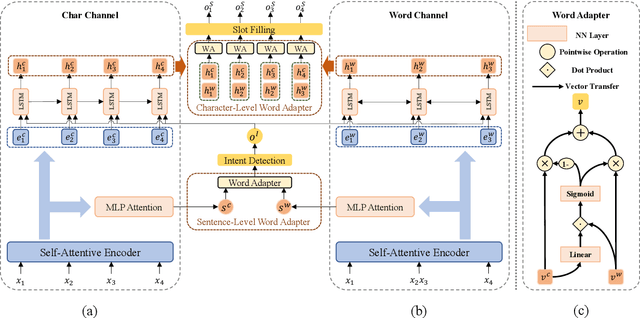Dechuang Teng
Injecting Word Information with Multi-Level Word Adapter for Chinese Spoken Language Understanding
Oct 08, 2020



Abstract:Intent detection and slot filling are two closely related tasks for building a spoken language understanding (SLU) system. In this paper, we focus on improving Chinese SLU by flexibly injecting word information, which has shown effectiveness for various Chinese NLP tasks. Previous studies on Chinese SLU do not consider the word information, failing to detect the word boundaries that are beneficial for intent detection and slot filling. To address this issue, we propose a multi-level word adapter to inject word information for Chinese SLU: (1) sentence-level word adapter, which directly fuses the sentence representations of the word information and character information to perform intent detection; (2) character-level word adapter, which is applied at each character for selectively controlling weights on word information as well as character information. In addition, the proposed word adapter is applied at the output layer, which can be utilized as a plugin and easily combined with other pre-trained models (e.g., BERT). Experimental results on two Chinese SLU datasets show that our model can capture useful word information and achieve state-of-the-art performance. More importantly, our framework substantially gains further improvements when we plug the word adapters into a BERT, which again demonstrates the effectiveness and flexibility of our word adapter.
 Add to Chrome
Add to Chrome Add to Firefox
Add to Firefox Add to Edge
Add to Edge